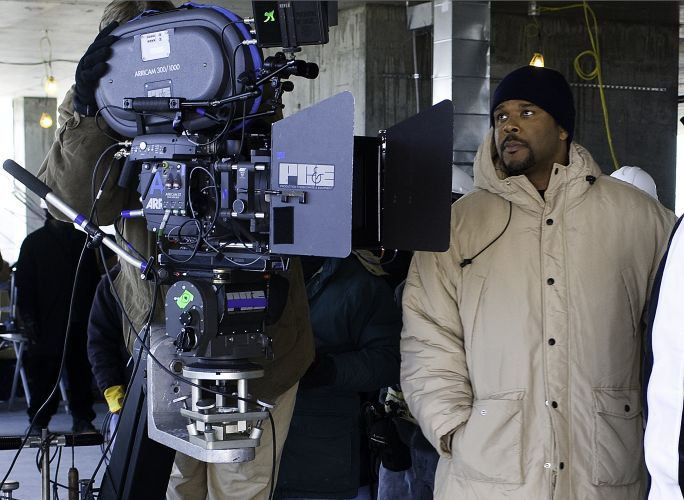Say what you want about Tyler Perry, but when it comes to building an empire out of nothing but a pen, a stage, and a loyal audience, the man is in a class of his own.
For Nigerian filmmakers navigating a growing but still chaotic industry, Perry is more than a successful director; he’s a blueprint.
From self-funded stage plays to owning one of the largest film studios in the U.S., Perry has done what many dream of: built his brand on Black stories, maintained full creative control, and made money doing it.
If you’re an up-and-coming Nigerian director, producer, or screenwriter, his filmography isn’t just entertaining, it’s educational.
Here are 10 Tyler Perry films that double as film school with real lessons for Nollywood’s next generation.
ALSO READ: ‘They’re trying to erase us, keep leaving footprints’ – Tyler Perry gets real at BET Awards
1. Diary of a Mad Black Woman (2005)
Write from the pain you know.
Perry’s breakout film, adapted from his stage play, wasn’t technically perfect, but it was raw, relatable, and hit like a church sermon. He tapped into a truth many ignored: Black women were hungry for stories that saw them.
Emotional honesty trumps polish. If your story is true, the audience will find it. Don’t wait for perfect gear, write from the gut.
2. Madea’s Family Reunion (2006)
Market what the industry won’t.
Critics may have rolled their eyes at Madea, but Perry understood his market: church-going, working-class Black families who wanted moral lessons and laughter. He sold out theatres while Hollywood said his work “wasn’t commercial.”
Find your tribe. Nigeria’s audiences are segmented, know who you’re speaking to and build directly for them. You don’t need to impress Cannes first.
3. Why Did I Get Married? (2007)
Create an ensemble and elevate your cast.
This film proved Perry could handle an ensemble with depth, balancing friendship, love, betrayal, and therapy. It helped launch the cinematic careers of stars like Tasha Smith and Jill Scott.
Treat your actors like collaborators, not just tools. An ensemble can elevate your script, attract fans, and create iconic roles.
YOU MIGHT LIKE THIS: Netflix’s ‘The Party’ is a stylish thriller that trips at the finish line
4. I Can Do Bad All By Myself (2009)
Build musicality into your films.
Perry doesn’t just use music as background, he uses it to advance emotion and story. From gospel to soul, his soundtracks carry weight and community meaning.
Music isn’t filler, it’s narrative power. Score your scenes intentionally. Think: what would a Tope Alabi track do in a Bimbo Ademoye meltdown scene?
5. Temptation: Confessions of a Marriage Counselor (2013)
Make morality entertaining, not preachy.
This film is messy, dramatic, controversial, and unforgettable. It shows how Perry uses spectacle to teach lessons, even if they’re exaggerated.
If you’re going to send a message, entertain first. People want story before sermon. Shock value? Sure, just don’t forget depth.
6. A Fall from Grace (2020)
You don’t need a Hollywood budget. You need a plan.
Shot in five days. With a crew of newcomers. On a limited set. And it still became a viral Netflix hit. Perry proved that speed and vision can outpace budget constraints.
Resourcefulness is your friend. If you’ve got five days, write a five-day script. Don’t wait for magic, make it with what you’ve got.
7. A Jazzman’s Blues (2022)
Your passion project deserves patience.
Perry wrote this film in 1995 but waited nearly 30 years to make it right. When it premiered, it blew critics away. A haunting tale of colourism, passing, and doomed love this is Perry at his most cinematic.
Not every script is for now. Some are for legacy. Keep writing. That passion piece may be your masterpiece.
8. Six Triple Eight (2024)
Tell the stories history forgot.
This WWII drama focuses on the all-Black, all-female battalion that sorted 17 million pieces of mail in Europe. Starring Kerry Washington, it’s a historical correction wrapped in a war epic.
Africa has thousands of untold stories. Where are our heroines of Aba Women’s Riot? Our Queen Amina battle dramas? Write what history left behind.


![Club World Cup: Guardiola unveils Man City’s squad for tournament [Full list]](https://t4tnews.com/wp-content/uploads/2025/06/MixCollage-20-Feb-2025-06-12-PM-3574-JqSvwT-1068x1068.webp)